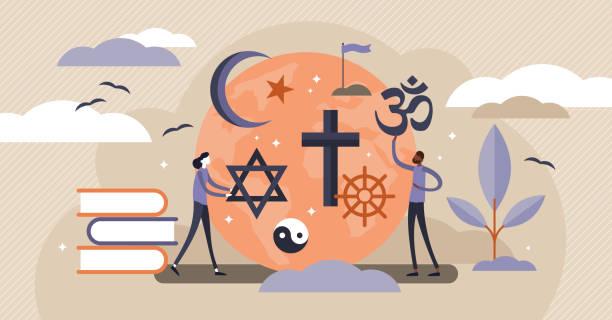Beliefs about life after death vary widely across different religions, reflecting diverse understandings of the soul, the purpose of life, and what happens after we die.
Here's an overview of these beliefs:
1. Christianity
- Belief: Christians generally believe in an afterlife where souls are judged by God. The righteous are granted eternal life in heaven, a place of peace and joy in the presence of God. Those who have rejected God or led sinful lives may be condemned to hell, a place of eternal separation from God. Some Christian denominations, particularly Catholicism, also believe in purgatory, a temporary state where souls are purified before entering heaven.
2. Islam
- Belief: Muslims believe in an afterlife where individuals are judged by Allah based on their faith and deeds. The righteous are rewarded with paradise (Jannah), a place of eternal bliss, while the wicked are punished in hell (Jahannam). However, God's mercy is emphasized, and those who repent may be forgiven and granted entry into paradise.
3. Hinduism
- Belief: Hinduism teaches the concept of reincarnation, where the soul (atman) is reborn into a new body after death. This cycle of birth, death, and rebirth (samsara) continues until one attains moksha, or liberation, where the soul is freed from the cycle and unites with the divine (Brahman). The nature of one's next life is determined by karma, the accumulated results of one's actions in previous lives.
4. Buddhism
- Belief: Buddhism also believes in reincarnation but focuses on escaping the cycle of birth and rebirth (samsara). The ultimate goal is to achieve nirvana, a state of liberation and freedom from suffering. Karma plays a crucial role in determining the conditions of future rebirths, but enlightenment is seen as the cessation of the cycle altogether.
5. Judaism
- Belief: Jewish beliefs about the afterlife are diverse. Some Jews believe in resurrection, where the dead will be brought back to life in a messianic age. Others believe in the immortality of the soul, where righteous souls enjoy a blessed existence in Olam Ha-Ba (the World to Come). However, Judaism generally emphasizes living a righteous life in the present world over detailed speculation about the afterlife.
AfriPrime App link: FREE to download...
https://www.amazon.com/Africircle-AfriPrime/dp/B0D2M3F2JT
6. Sikhism
- Belief: Sikhs believe in reincarnation, where the soul is reborn until it merges with Waheguru (God) through righteous living and spiritual devotion. The ultimate goal is mukti, liberation from the cycle of rebirth, leading to union with the divine. This liberation is achieved through good deeds, meditation, and devotion to God.
7. Taoism
- Belief: Taoism emphasizes living in harmony with the Tao (the Way) rather than focusing on the afterlife. Some Taoist traditions, however, include beliefs in an immortal soul that can achieve spiritual immortality through virtuous living and practices like meditation. The afterlife may be seen as a continuation of one's spiritual journey in harmony with the universe.
8. Confucianism
- Belief: Confucianism does not focus extensively on the afterlife, emphasizing instead the importance of living a moral life in the present. Ancestor worship is an important practice, with the belief that the spirits of ancestors continue to influence the lives of their descendants. The afterlife is seen as less significant than maintaining harmony and fulfilling one’s duties in this life.
9. Indigenous and Animistic Beliefs
- Belief: Many indigenous and animistic traditions believe in a spiritual afterlife where the souls of the deceased continue to exist in a different realm, often closely connected to the natural world or the community. Ancestors are often venerated, and the afterlife may be seen as a continuation of earthly life or a journey to a spiritual world where the soul interacts with other spirits or deities.
10. Zoroastrianism
- Belief: Zoroastrianism teaches that after death, souls are judged based on their deeds. The righteous cross the Chinvat Bridge to a paradise, while the wicked fall into a pit of punishment. The final judgment involves the resurrection of the dead, and the ultimate triumph of good over evil, leading to the renewal of the world.
AfriPrime App link: FREE to download...
https://www.amazon.com/Africircle-AfriPrime/dp/B0D2M3F2JT
11. Shinto
- Belief: Shinto, the indigenous religion of Japan, believes in a continuation of life after death, where the soul becomes a kami (spirit) that can influence the living. Ancestors are revered, and the afterlife is closely linked to the community and the natural world. The focus is on maintaining harmony with the kami and the environment.
12. Jainism
- Belief: Jainism believes in reincarnation, where the soul is reborn based on its karma. The ultimate goal is to achieve liberation (moksha) by shedding all karma and becoming a pure, omniscient soul (siddha). The afterlife involves either continued existence in the cycle of rebirth or liberation from it.
13. Ancient Egyptian Religion
- Belief: The ancient Egyptians believed in an afterlife where the soul was judged by Osiris. Those who led righteous lives were granted eternal life in the Field of Reeds, a paradise that mirrored their earthly life. The wicked faced annihilation or eternal punishment in the underworld.
14. Greek and Roman Religions
- Belief: In ancient Greek and Roman religions, the afterlife was seen as a journey to the underworld, where souls would be judged. The virtuous might find peace in the Elysian Fields, while the wicked would be punished in Tartarus. The afterlife was often depicted as a shadowy continuation of life.
These diverse beliefs reflect different understandings of the soul, morality, and the purpose of life, with the afterlife often seen as a continuation or culmination of one’s earthly existence.
AfriPrime App link: FREE to download...


